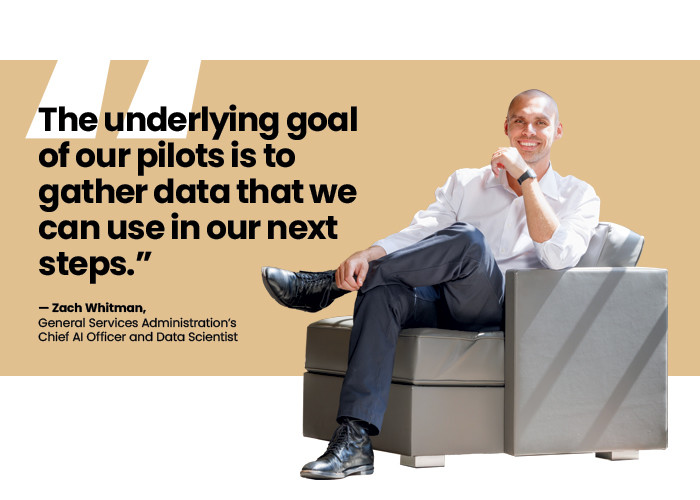FEDTECH: You are pursuing generative AI pilots. Can you give us examples of how you are testing and experimenting with the technology?
WHITMAN: We’re taking several approaches to assessing generative AI, ranging from what it takes to set up an environment designed to support it — from an agency perspective — to what it would look like to implement GenAI tools across the workforce. Some of these pilots are examining the infrastructure needs, others the data needs and ultimately the specific AI that supports mission delivery. The underlying goal of our pilots is to gather data that we can use in our next steps.
For example, the robotic process automation initiative looks at how AI can automate repetitive tasks within the agency. This project assesses the infrastructure requirements for deploying RPA solutions and evaluates their impact on workforce efficiency and productivity.
Likewise, GSA’s pilot of an AI chatbot for customer service investigates how AI can enhance customer interactions by providing real-time support and information.
These pilots are largely designed to provide insights into the practical aspects of implementing GenAI, from setting up the necessary governance and technical infrastructure to understanding the data and AI models that best support our mission delivery.
FEDTECH: What have you learned so far from these efforts? What are the benefits you see and the potential for this technology?
WHITMAN: While it’s still early days, we’ve learned quite a bit from our GenAI pilot projects; specifically, the importance of having the right infrastructure and high-quality data in place for AI to perform accurately and reliably.
As for benefits, one of the most notable findings we’ve seen is GenAI’s potential to increase efficiency for GSA staff by streamlining processes and reducing manual effort. We were one of the first agencies to establish a security policy that allowed staff to test public large language models. We then surveyed those users and learned a lot about what the perceived benefits and drawbacks of those tools were. Research like that plays a big role in shaping our initiatives.
We’ve also found issues with our GenAI deployment tests that really stress the importance of our team’s ability to monitor and improve upon the outputs of these systems. Ultimately, these pilots underscore a crucial point: The expertise and dedication of GSA staff are indispensable to any successful GenAI integration.












